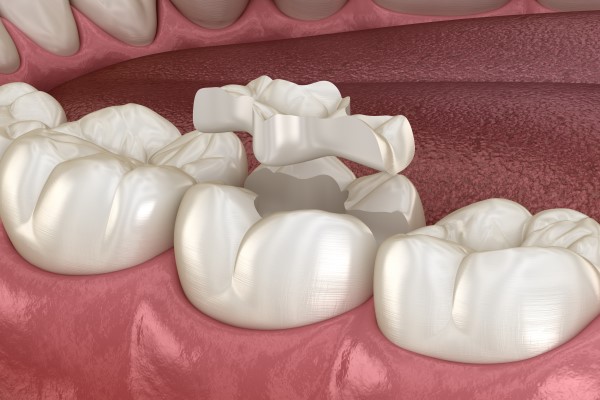What Is a Dental Inlay and How Is It Used?

A dental inlay is a common type of restoration used in dentistry. It is considered to be indirect, which means it is made outside of the patient's mouth, in a dental lab. Dental inlays, among other restorations, can significantly improve one's oral health, allowing for strong, healthy teeth. Ready to learn more?
Dental inlays
Outlined below is important information on dental inlays, which can be helpful to someone who requires a dental restoration.
How dental inlays are used
Dental inlays are typically needed when a tooth is infected from a cavity. However, the cavity is often too big for a traditional filling, but too small for a dental crown. Dental inlays are a good in-between restorative option for patients who have moderate cavities. They are placed in between the grooves of a molar tooth but do not extend past the cusps, which is what sets them apart from onlays.
Additionally, dental inlays can be used for fractures or breaks in molar teeth that cannot be restored through a dental filling or dental crown.
The dental inlay process
When a patient visits their dentist for a dental inlay, they should expect to undergo two to three appointments in order for the entire process to be complete. Outlined below is each step of the dental inlay process.
- Just like with any other dental restoration, a dental inlay requires the patient to be numbed with an anesthetic.
- Once fully numbed, the dentist will use a dental drill to remove the decayed parts of the tooth.
- After the decayed parts have been removed, the dentist will take impressions of the tooth that is decayed. The impressions will be sent to a lab for the dental inlay to be created.
- The patient will have to wait a few days in order for the dental inlay to be created. Once created, the patient will return to the dentist's office.
- During a second appointment, the dental inlay will be molded to the patient's tooth, which allows for the restoration to be complete.
- There may be a required follow-up dentist appointment to ensure that the inlay is fitting perfectly and the patient is adapting okay.
The steps of the dental inlay process may vary depending on the patient's specific needs.
Things to know
Dental inlays are typically sourced from porcelain or composite resin materials. Both are able to be matched to the patient's tooth natural color, which allows for discreetness and an aesthetically-pleasing restoration. It has also been said that dental inlays are more reliable than dental fillings. Because they are indirect, they are known to provide more strength for a tooth that is in bad shape.
Reach out today!
Want to know more about dental inlays? With the help of a dentist's office, dental inlays can be further reviewed. Any questions or concerns regarding dental restorations should be addressed by our team. Reach out today to learn more or to get started! We are here to help.
Request an appointment here: https://www.drelloway.com or call Randal S. Elloway DDS, Inc at (530) 527-6777 for an appointment in our Red Bluff office.
Check out what others are saying about our dental services on Yelp: Dental Restorations in Red Bluff, CA.
Related Posts
Dental restorations can fail. Seeing your dentist right away can help correct the situation if it happens. Your restorations may need replacements already. Routine dental visits allow your dentist to check your restorations and schedule the next appointment for the re-treatment. If you want to know what happens when dental restorations fail, here are the details.Dental…
As you age, your teeth face challenges from numerous issues. Daily wear from chewing food or stress-related grinding, gum problems from bacteria build-up, and tooth damage from the foods and drinks you consume all play a role in the deterioration of your smile.You and your dentist share a common goal: caring for and preserving your…
Are you in need of dental restoration and don’t know where to turn? You are not alone. Countless patients ask themselves this nagging question daily. We all want to have the most beautiful and bright smile but aren’t sure how to achieve our goal. Fortunately, there are solutions that you can count on. There are many…
Dentists perform dozens of types of dental restorations, ranging from minimally invasive fillings to invasive but wholly restorative dental implants. When a dentist discusses the need for you to invest in restoration, you may wonder how they will make a recommendation. What factors will the dentist consider when deciding what techniques and materials to use…


